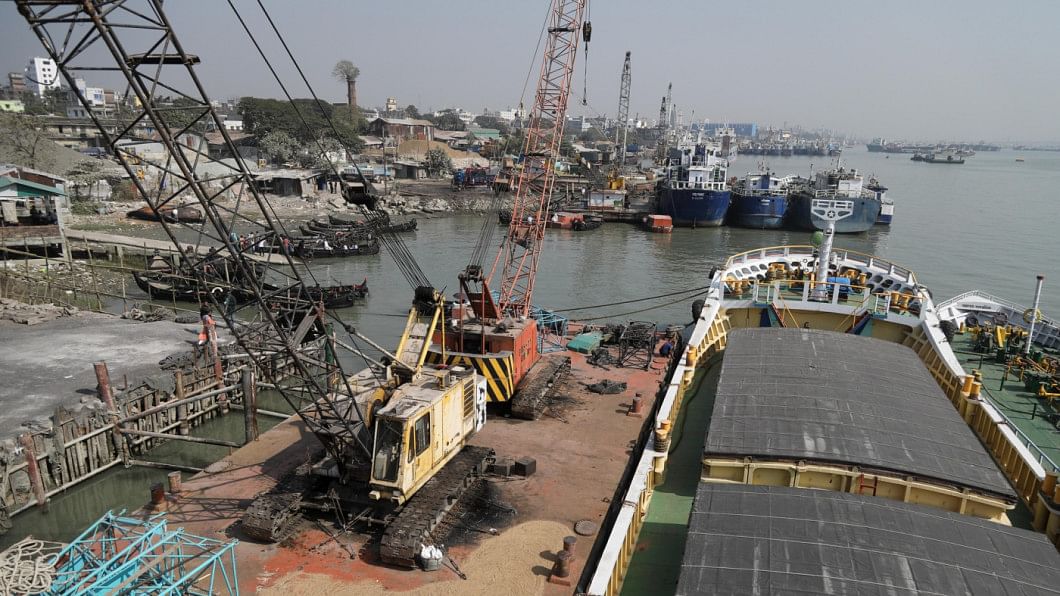Water transport strike disrupted supply chain

Inland water transport is still one of the major modes of cargo transportation in Bangladesh, a country crisscrossed by hundreds of rivers.
Take the instance of transportation of cargo imported through the country's premier seaport of Chattogram.
Over 60 percent of the 10 crore tonnes of cargo annually imported through this port is unloaded from large ships at sea.
Those are then transported by smaller lighter vessels through inland water routes to over 50 destinations or river points across the country.
Over 80 percent of cargo imported in bulk is delivered at sea and transported through waterways.
According to Bangladesh Inland Water Transport Authority (BIWTA), overall cargo transported annually through the inland water routes reached 15 crore tonnes in fiscal year 2023-24.
It was merely 1.78 crore tonnes in fiscal year 2013-14.
So, a single day of service suspension in the sector can take a very heavy toll on the country's daily trade, businesses and economy as a whole by manifold.
This is in terms of disruptions to supply chains and market stability and the hampering of industrial production.
Businesses felt this recently.
A two-day work abstention enforced by water transport workers ending on Saturday night brought cargo unloading at sea and river landing points as well as transportation over inland water routes to a standstill.
At least 20 mother vessels passed idle times with 4.50 lakh tonnes of imported cargo at Kutubdia and the outer anchorage of the Chattogram port.
As each of these vessels had to count $20,000 on an average in demurrages for each day passed idle, the demurrage over these two days totalled to not less than $8,00,000.
According to the businesses, such demurrages would ultimately be added to the import cost.
Another 10.50 lakh tonnes of goods got stuck in 773 lighter vessels, according to Bangladesh Water Transport Coordination Cell (BWTCC), a private organisation that allocated these lighter vessels.
These vessels were either unloading those goods at 60 different destinations across the country or on way to those destinations.
These goods include mostly commodity items like wheat, sugar, lentil, yellow peas, salt, edible oil, coal, stone, industrial raw materials like cement clinker, slag, fertiliser and others.
Around 1,700 lighter vessels—1,200 owned by individuals and 500 owned by industrial units—are engaged in transporting these goods from Chattogram to the river landing points.
Parvez Ahmed, a leader of the Inland Vessel Owners Association of Chattogram (IVOAC), said importers usually hire these lighter vessels on condition of completing the transportation and unloading within a timeframe.
They have to pay Tk 2,000 to the vessel owner for use of the vessel for each additional day, he said.
Any disruption in the supply chain can lead to volatility in the commodity market, which fluctuates very frequently, and this is not acceptable when people are suffering from high inflation, he said.
The service suspension also affected transportation of goods to industrial units, hampering production schedules, he said.
Satyajit Das Barman, head of business (grains and logistics) at TK Group, said the impact of a day of service suspension in waterway transportation was manifold.
Two vessels carrying around 77,000 tonnes of wheat imported by TK Group from Canada and Russia arrived on Thursday and had to pass idle times since yesterday morning.
If there was no service disruption, they could have started getting the cargo since Friday night and they had made promises to clients based on that assumption, said Barman.
Now they would have to wait till Tuesday to get the cargo, he said.
"Our vessel arrived at a time when there was no other vessel with fine quality wheat from Canada, which has strong market demand. If we got the cargo timely, we could have gained from the market a bit," he added.
"Production in our flour factories got hampered for failing to avail the cargo while production in the bakeries we supply flour to also was hampered," he said.
The country's industries are heavily dependent on the timely supply of raw materials and any sort of disruption in the supply chain badly affects industrial production, said Seacom Group Chairman Mohammed Amirul Haque.
By bringing cargo transportation to a standstill on calling the strike, the workers held the businesses and industries hostage, which is totally unacceptable, he said.
He alleged that Water Transport Workers Federation was controlled by former shipping minister Shajahan Khan, who had frequently caused disruptions to cargo transportation with ill motives under the pretext of movements for labour rights.
"It is frustrating that such issues still exist even now," Haque said.
The businesses urged the government for streamlining cargo transport over waterways and taking steps to stop such sudden service suspensions, especially considering the crucial period the country's economy was passing through.

 For all latest news, follow The Daily Star's Google News channel.
For all latest news, follow The Daily Star's Google News channel. 



Comments